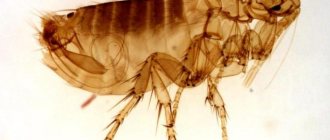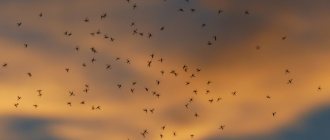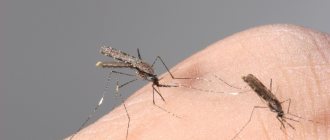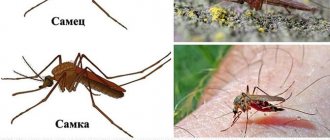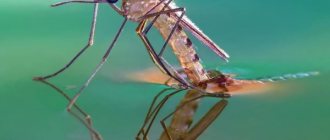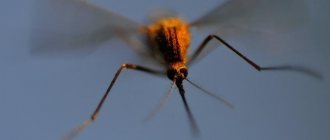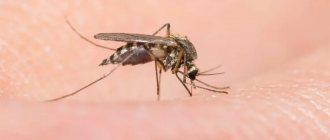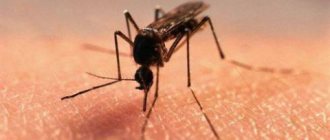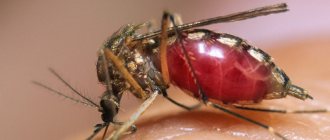Mechanism of sound appearance
The squeak of a mosquito is familiar to everyone - extremely thin, annoying, irritating.
Warns that at the slightest opportunity a bite will follow. It would be much more profitable for a blood-sucking creature to approach the victim silently, but the parasite cannot prevent the appearance of a special signal. It does not produce sound from the mouth or nasopharynx. What a mosquito squeaks is of interest to many. The sound comes from its wings, which it flaps with extraordinary speed. When it comes into contact with air, a sound similar to squeaking appears. A peculiar buzzing sound begins to be emitted immediately with the first flap of its wings.
Interesting!
Why mosquitoes do not buzz, like many other insects, also has its own explanation. The wings are extremely thin and narrow, and the mosquito itself is miniature in size. In blood-sucking creatures, special halteres, not wings, are responsible for balance in the air. Therefore, the sound is produced more by these parts of the body than by flapping the wings at high speed.
Mosquito squeak
The nature of mosquito squeaks
Actually, the insect, which lives on all continents with the exception of Antarctica, does not make high-pitched sounds during flight on purpose. This is due to the peculiarities of physiology. The reason for the specific itching, and not the buzzing that larger insects emit, is the small size of the body and thin, narrow wings. For example, the flapping frequency of a large bumblebee, which buzzes almost in bass, varies from 120 to 250 Hz. Whereas in a mosquito this figure is already 1000 Hz! When flapping, wave-like vibrations of air occur, which diverge from the insect to a certain distance. It is these sounds that the human ear perceives as a squeak. At the same time, females squeak louder because they flap their wings more often compared to males. The younger the individual, the higher its squeak will be.
During the mating season, females attract males by squeaking: they catch the waves with the help of their sensitive antennae. Entomologists also believe that bloodsuckers make sounds to attract their own relatives, alerting them to danger or the presence of a potential food source. This is why an annoyingly squeaking cloud of mosquitoes soon forms near people who go out into nature: the insects are preparing for a meal and inviting fellow tribesmen to a feast
Why do mosquitoes buzz?
A mosquito is a two-winged insect from the long-whiskered group. The bloodsucker has a thin body, ranging from 4 to 14 mm in length. It has narrow, colorless wings, as well as elongated legs.
On the head there is a proboscis and two antennae. The color is brown, gray or black.
Insects live everywhere except Antarctica. Bloodsuckers live in forests in humid areas. They are distinguished by fast flight, the speed of which is 3.2 km per hour.
Most insects buzz. But not many people know why the mosquito squeaks. It produces sound due to its small body size and thin, narrow wings, which are the dorsolateral appendages of the middle thorax, which are developed in a single pair.
The appendages are oval in shape and have straight edges. Posteriorly there is an alula and an upper calypter covered with hairs.
During the flight of the little bloodsucker, a high-pitched signal resembling a squeak appears. The buzzing of a mosquito is accompanied by a subtle sound, since the oscillation frequency of its wings is from 1000 Hertz.
For example, a bumblebee creates a bassier sound when flying. This is not surprising, because the flapping frequency of its wings is 130-240 Hz.
It is interesting that butterflies fly silently. This is explained by the minimum number of movements of their wings, which is 5-9 Hz. But one species of lepidoptera is considered an exception - the hawk moth. This butterfly is also capable of squeaking.
Females can squeak more powerfully than males. Therefore, people hear mosquitoes that flap their wings more often than males. Moreover, the younger the female, the higher she will squeak.
Scientists also claim that bloodsuckers make a high-pitched sound, notifying their relatives of impending danger or the presence of a food source. That is why a large number of insects gather near a person in nature.
And why are they buzzing?
Thus, the specific sounds of these blood-sucking insects perform several functions:
1. Communicate with each other through ultrasonic signals.
2. Females attract males for mating;
3. Ensuring balance when hovering in the air.
Of course, due to the ability to quickly rotate their wings, mosquitoes look like a kind of mini-helicopter. Which is useful when you need to hover in the air and carefully choose a more appetizing lunch and slowly, so as not to actively fight off the gourmet. And since you need to share with friends, including the coordinates of a juicy little man, snoring peacefully and unaware of the attack, then a vile buzz is indispensable for notification.
Interesting facts about mosquitoes, or why you should respect the bloodsucker
At first glance, a mosquito is an ordinary insect that has no benefit. It prevents us from sleeping at night, annoying us with its thin squeaks and painful bites. However, this pest is not as simple as it seems. The mere fact that the life of a mosquito began about 40 million years ago is amazing! And this is only the first chapter of his amazing story. We have collected the most interesting facts about mosquitoes, which will slightly lift the veil of secrecy and shed light on the mystery of the existence of this seemingly inconspicuous insect.
Beginning of life
First you need to find out where mosquitoes come from. These small, ubiquitous insects emerge from eggs that females carefully lay on the surface of the water. The clutch immediately sinks to the bottom and after a few weeks the eggs turn into pupae, fully adapted to existence in an aquatic environment.
After some time, the small pupa completes the formation of all organs, after which it floats to the surface of the reservoir, the cocoon opens and an adult emerges from it.
Miracles of body structure
It is difficult to determine the exact mass of a mosquito, since its value is largely determined by the amount of food eaten. But there are still averages:
- a hungry insect weighs no more than 2 mg;
- Well-fed weight can reach from 3 to 5 mg.
Mosquito legs - what's special?
Many people are interested in the question of how many legs a mosquito has. He has three pairs of legs, like most insects on our planet. Each tarsus consists of five segments, and the last one necessarily has suckers, which are developed differently in each specific species.
However, it is not the number of legs that is of interest, but those very suction cups that allow the mosquito to calmly hold its body on vertical surfaces.
Oral apparatus
The mouthparts of a mosquito are no less interesting. It consists of two pairs of jaws and two lips - upper and lower. The lips of this insect are slightly elongated and, having such a structure, resemble a gutter. If you look inside it, you can find long needles that are jaws.
So, these insects have jaws, lips and even a tongue that produces saliva. And here a reasonable question arises: do mosquitoes have teeth? And what’s surprising is that there is. They are very small, and their number reaches 50 pieces. It is thanks to them that the bloodsucker can pierce the skin.
What are wings - the ability to fly or... sing?
Another amazing feature of these insects is the ability to squeak in the absence of a voice. So, why does a mosquito squeak? In fact, the squeak is not the result of the vocal cords, but the sound it makes with its wings.
On a note! Other insects are also capable of producing characteristic sounds using only their wings. And most of them make a buzzing sound - flies, bees, bumblebees, wasps, etc.!
Why doesn’t a mosquito buzz, but rather squeak? It's all about size. His wings, like himself, are very small and also quite thin and narrow. Each wing beat merges with the sound of the next beat, generating a high-frequency sound that our ear perceives as a squeak. How many flaps per second does a mosquito make? Their frequency is incredibly high and amounts to about 600 times per second!
Reason for the squeak
An unpleasant sound for humans occurs as a result of the flapping of mosquito wings. The pest is capable of swinging from 500 to 1000 times per second, and the Forcips species is the leader among mosquitoes - up to 2000 swings per second.
Air compactions and expansions form near the wings. Hence the unpleasant squeak. The fly flaps its wings more slowly, and therefore it produces a buzzing sound. The bumblebee is buzzing because... the swings are even slower than those of a fly. If mosquitoes were larger and flapped their wings more slowly, they would produce a sound that was louder than a squeak.
In young and adult females, the squeak produced by flapping their wings is different. Males recognize adult females by characteristic sounds and mate with them. At this moment, mosquitoes gather in a swarm. A large number of squeaking pests in a room can reproduce.
The mosquito is unable to produce a squeak using other organs or parts of the body. For a person, the advantage of the squeak made by a pest is that you can prepare for an insect attack and kill it before it tastes blood.
So, a mosquito squeak is just a sound made by its wings.
Different mosquito squeaks
Initially, it seems that all mosquitoes squeak the same way, but if you listen, the sounds are different. Males create a hum and are not particularly annoying to the human ear. Since they are not interested in blood, they are seen much less often than females.
Females communicate using squeaks. They transmit messages to each other about the location of a potential victim and warn of danger. Females attract males for mating with a thin squeak and flap their wings more often than usual. After fertilization, the individual sits quietly on the sidelines for several days, digesting food. And also during this time eggs are formed. Laying is done in a couple of days in a standing pond.
On a note!
Mosquitoes are attracted to a person by the smell of lactic acid, carbon dioxide, and infrared color, which forms an aura around the body. As soon as one female discovers a victim, after a few minutes a person has to fight off a colony of annoying pests
The squeak of a mosquito is the sound of flapping its wings, and males never bite people
It turns out that the squeak of a mosquito is not a voice, but the sound of flapping wings, the number of vibrations of which is 450-550 times per second. Moreover, mosquitoes have only two pairs of wings. The weight of the insect is so small that a light breeze poses a mortal danger to it, and the web into which the unfortunate person falls does not even lose its integrity and weaving pattern.
It is difficult to find a person who would like mosquitoes. They are carriers of harmful infections, allergens and irritants. But this insect is a treasure trove of interesting facts.
It has been proven that only females . The purpose of blood consumption is reproduction. Males feed on water and pollen, which confirms their lack of interest in humans. The life of males is fleeting: 2-4 weeks , females - up to one and a half months.
Blood rich in useful elements is not a thirst for satiety, but a need for prolongation of the family. It is the blood protein, when processed in the female’s stomach, that is responsible for the production of protein in the eggs. By feeding on blood, females are able to lay eggs several times during their fleeting lives.
By biting the skin, mosquitoes inject saliva, which anesthetizes the bite site and also makes the blood more fluid. It is saliva that causes irritation, swelling and itching after a mosquito bite.
Female mosquitoes prefer dense, sweaty victims. Hunters smell the sweaty body and lactic acid secreted from sweat 2 kilometers before approaching the victim. The individual scent of a person can radically change the flight path of an insect.
Exhalation saturated with carbon dioxide is another lure for females. Mosquito antennae are scent-catching locators. In pursuit of a victim, a mosquito can cover a distance of 64 kilometers in one go.
The maturation period of the offspring is up to 4 days: from the birth of the egg to the laying of eggs. Mosquito eggs laid in the ground can lie for a long period until the opportune moment arrives.
Read also: Snails hibernate for three years - reasons for long sleep and ways to wake up
Having heard the sound of a mosquito within the radius of one’s stay, a person immediately starts hunting for the annoying insect. Of course, the carrier of pathogenic bacteria must be immediately neutralized and destroyed. But one cannot fail to note the benefits of dipterans, which also occur in natural processes:
- Being a source of food for many animals and fish, mosquitoes participate in regulating stable food circulation in nature;
- males ensure plant pollination by feeding on pollen and nectar and carrying them on their proboscis and paws.
This is what a mosquito is like - a small squeaking insect that irritates in the summer heat and provides a diet for animal fauna.
Vote for this post!
( 1 ratings, average: 5.00 out of 5)
Also interesting facts
Belgian Blue bulls look like jocks and weigh more than a ton
The Alaska rabbit with fox fur was bred specifically for its fur.
The dung beetle is the most powerful insect
Interesting facts about crabs, appearance, lifestyle, benefits for the biosphere
Interesting facts about cheetahs, appearance, distribution, lifestyle, population status
Interesting facts about snow leopards, features, character, impact on the biosphere
Tigers can go without food for two or even three weeks
Interesting facts about panthers, description, lifestyle and habitat, role in the biosphere
What does a mosquito squeak?
Answering the question of what a mosquito squeaks with, experts say that the nasopharynx or mouth is not involved in this process. The squeak is created by wings fluttering at high speed. When they interact with air, a squeaking sound occurs. Moreover, the buzzing appears even with the first flap of the wings.
A thin squeak is produced due to the presence of narrow, thin and small wings of the pest. It is also allowed to squeak by special halteres located on its miniature body.
So, there are many reasons why a mosquito squeaks. The first factor is that bloodsuckers communicate with each other through ultrasonic signals, the second is that the buzzing sound appears during the frequent flapping of their thin and small wings.
Thirdly, the squeak occurs because the mosquito, while in the air, uses its halteres, which are responsible for balance and hovering. And females make high-frequency sounds to attract a male for mating or to repel him during pregnancy.
A mosquito can squeak for various reasons, but this ability is not entirely safe for the insect itself. After all, the victim hears that the bloodsucker is approaching, which allows it to often avoid an attack or even destroy the pest.
Why do mosquitoes squeak?
Who loves mosquitoes? How can you even love these vile buzzing insects that are ready at the first convenient opportunity to bite into you and suck your blood, leaving mercilessly itchy wounds? And yet, despite all your dislike for mosquitoes, you were probably curious to know more about them. Think about it, what do you even know about mosquitoes? A couple of myths? Your own negative experience? How to choose a mosquito repellent
? Why do mosquitoes bite people? Why do they make a nasty squeak? Why do they even exist, why did nature conceive these little villains? You need to know the enemy by sight! Let's learn more about mosquitoes.
Why are ultrasonic repellers effective?
Simple devices have been used for several years to repel mosquitoes. They work on the basis of ultrasound, which imitates the sound of natural enemies - dragonflies, bats, and fertilized females. Mosquitoes pick up ultrasound vibrations at a distance of several meters and try to stay away from such a place.
The ultrasonic repeller clears the room of annoying bloodsuckers within 30 minutes. Even with open windows, pests do not fly into the house. This once again confirms the fact that mosquitoes squeak for a reason; they emit special signals.
The characteristic squeak does not always work to the benefit of mosquitoes. Their approach to a person gives them away. Since bloodsuckers are not able to quickly respond to movement or air vibrations, swatting them down is not difficult.
Sources
- https://apest.ru/komary/o-komarah/pochemu-komary-pishchat/
- https://fishki.net/3386030-komarinyj-pisk-zhara-ijuly-chem-zhuzhzhat-komary-i-pochemu-oni-jeto-delajut.html
- https://klopkan.ru/komary/pochemu-komar-pischit-a-ne-zhuzhzhit-chem-i-kak-on-izdayot-takoy-zvuk/
- https://komarmuha.ru/pochemu-pischat-komary
- https://notklop.ru/komary/o-komarah/pochemu-komary-pishchat/
- https://parazitdoma.ru/drugie-parazity/pochemu-komar-pischit
[collapse]
Reasons for the effectiveness of ultrasonic repellers
Insects emit a characteristic squeak to convey to others a signal of danger. Fertilized females use sound to repel males. Ultrasonic repellers imitate danger signals - the flight of a dragonfly, the signals of a bat, and also the warning of a fertilized female. Simple devices are extremely effective in the fight against bloodsuckers, which once again confirms their important role in creating the squeak of mosquitoes.
In parallel with this, the characteristic sounds of mosquitoes indicate the approach of insects to the victim - a person, and risk being killed. The same feature notifies natural enemies about the location of food.
